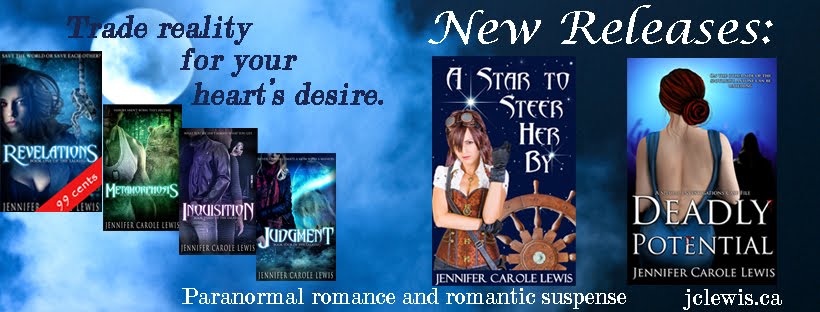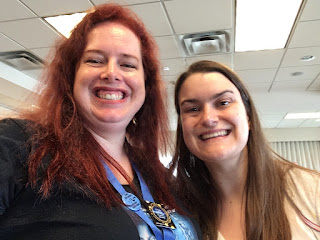Since then, I've been doing a lot of thinking about that statement and now I can articulate why I vehemently disagree with it. There are a couple of over-all reasons. First, I write what I love and therefore not watching or reading stories in that genre would deprive me of a huge source of pleasure. Second, it's way easier to avoid copying someone else's work if you know what's out there.
 |
| I know! I could have a cop who's part robot!... Already done. Okay, back to the drawing board. |
The first one on the list is a fellow Canadian gal: Tanya Huff, who writes in a wide variety of genres: high fantasy, urban fantasy, science fiction. One of her series is about a vampire living in Toronto, the son of Henry the VIIIth and it was made into a television series, Blood Ties. But my favourites of hers are the Keeper and Gale Women series, though I am also really enjoying her Peacekeeper series.
Tanya Huff was the first author I read who wrote the kind of stories that I wanted to write: fast-paced action, elements of humour that didn't undercut the characters or plot, and with strong female characters who weren't always taking time out to be kidnapped, rescued or threatened. When I read her books, I'm not even aware of the process of internalizing the words: I'm living the story along with her characters. She is also absolutely brilliant at creating diverse casts of characters. She's stated that readers should assume that all of her characters are bisexual, unless otherwise made clear in the text. And unlike many authors who have claimed that their characters are diverse but haven't included actual references in the text, there are plenty of examples to cite from within the books. The most powerful people in her Gale Women series are the aunties, who come into their true power once they are post-menopausal. Older women aren't sidelined, they're the magical equivalent of thermonuclear weapons.
The next one on my list is JMS (J. Michael Stracynski) who has a long list of writing credits on various shows over the last forty years. My favourites are the television show Babylon 5 and the comics, Midnight Nation, the Amazing Spider-Man and Rising Stars.
To say that JMS changed how television works is a fair statement. He wrote the vast majority of the individual shows for Babylon 5 and rather than finish each episode by effectively re-setting, he allowed the characters to grow and change. There wasn't a Big Bad each season to defeat, instead the characters dealt with a complicated world that felt real. And that's one of the aspect of JMS's writing that I strive to recreate: how real both his characters and his world felt. An episode might focus on the search to catch a killer, but then a newspaper headline in the background will give the result of the trial ten episodes later. I have to remind myself that Londo and G'Kar are not real people because they were presented as such solid, three-dimensional, shades-of-gray characters that they felt absolutely real.
The other aspect of his writing that inspires me is his ability to evoke powerful emotions through his words. In the aftermath of 9/11, the Marvel writers were trying to decide if the Marvel superheros (most of whom live in New York) would acknowledge the tragedy or if their stories would pretend it hadn't happened. JMS wrote an incredibly powerful and moving story about Spider-Man and the other heroes dealing with the tragedy and coming to terms with not having been able to stop it. The Declaration of Principles from Babylon 5 is still recited around the world.
That leads me smoothly to the next example on my list and this one isn't a single author, but rather an entire company: Marvel Comics and the MCU (Marvel Cinematic Universe). I've been a comic book geek for a long time and enjoy both the Marvel and DC Universes (among others). But Marvel has done something extraordinary throughout its seventy year history. They created individual worlds and stories that overlap and connect, giving their "fantastic and amazing" stories a sense of grounded reality. Daredevil lives in the same world as Tony Stark or Wolverine and they are all effected by the same events.
It makes for harder writing, since writers must come up with reasons why characters in one series wouldn't call for assistance from characters in another. And I'm sure there have been many tooth-gnashing meetings as someone realized that what they were doing in one storyline would affect those in other storylines. But for the most part, the different characters and stories have come together smoothly enough that I believe Marvel when they say they are plotting the key points out in advance (not all of them, but enough major plot points to keep everyone moving in the right direction). That sense of interconnected realism is something that I strive for in my own stories, though it's much easier to keep track with only one brain doing the plotting. They are why all of my novels and short stories are set in the same universe, even though they focus on different aspects of it.
The next favourite writer on my list is another Marvel alum, Joss Whedon, whose Astonishing X-Men series is still a favourite re-read of mine. And of course, he is also the writer behind several of my favourite television series: Buffy, Angel, and Firefly, not to mention the Avengers and Avengers: Age of Ultron movie.
Joss is known for his clever dialogue which tends to be full of pop-culture references. But his ability to play with language doesn't always rely on common experience. For Firefly, he created a new vernacular for the show, one that was still comprehensible to us but was believable as how the language could have evolved over the next few centuries. As a language geek, I enjoyed figuring out how "shiny" became the new "cool" almost as much as the stories. But he is also highly skilled at including humour that works to accent the horror and thrills of his stories. The tiny breaks in the tension keep the stories from becoming overwhelming and depressingly dark, but also don't distract from the emotional impact. They endear his characters to the audience and keep us coming back to his worlds.
And last (because I have to end this post at some point, though I could keep on citing more and more writers) but certainly not least is a relatively new (at least to me) writer, Sherrilyn Kenyon. Her Dark Hunter and League series are both great reads with strong characters and fast-paced plots. But the aspect of her writing that impresses me most and that I strive to emulate is her ability to take villains from one story and show them as heroes in another.
"Your villain has to see themselves as the hero of their own story" is a fairly common piece of writing advice, mainly intended to curb the tendency to treat villains as only being interested in Evil, rather than being developed characters in their own right. But what Sherrilyn Kenyon does is more that that. She uses her characters to show that too often, we only know small pieces of someone else's story and we judge them for it as if it was the whole truth. The best example of this occurs in her two books: Acheron and Styxx. Though they are number 14 and 22 in her Dark Hunter series, they can be read independently.
I could keep fan-girling on about all of these writers and their work. And hopefully if you're not familiar with them, you'll give some of these examples a try. But I'm also hoping that I've made my original point: to cut yourself off from any genre is to deny yourself the chance to learn from the writers in it. There are all kinds of amazing examples to learn from out there.
For those interested in seeing how well I incorporate these examples into my own work, you can check out my Lalassu series about a secret society of superheroes. Book 1: Revelations is on sale for 99 cents US (or local equivalent) and Book 4: Judgment just released a few weeks ago.
Previous post: The Stages of Social Awareness. As we move through life, we can only experience our own version of the world directly, but there are lots of worlds to become aware of. I used the process of learning about these worlds as part of the structure of Judgment.
Blog homepage
















